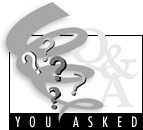|
|
Deterring Plagiarism
Web Can Be Foe or Friend
|
|
|
|
Deterring Plagiarism
Web Can Be Foe or Friend
|
|
 Q. With the Web enabling so many students to download pre-written papers and reference materials, I am concerned about the rise of plagiarism. Are there online resources that will help me detect plagiarism? How can I better prepare my students to avoid falling into this trap as they begin to use more and more online sources? Q. With the Web enabling so many students to download pre-written papers and reference materials, I am concerned about the rise of plagiarism. Are there online resources that will help me detect plagiarism? How can I better prepare my students to avoid falling into this trap as they begin to use more and more online sources?A. We certainly had fewer answers to these questions when a Sacramento TV station sent a camera crew out to Voorhies Hall in 1997 to interview me about the new phenomenon of sites on the Web -- with names like "Schoolsucks.com" and "Paperwriters.com" -- that offered free or fee-per-page academic term papers students could download and submit in lieu of actually researching and writing the essays themselves. As the reporter and I viewed the evidence, we shook our heads and lamented that the Internet offered so many ways to tempt a student to violate a university's code of academic conduct. Junk and Gems Co-Exist on the Web
Most of us recognize that, as was the case four years ago, there is still a lot of junk on the Web. But there are some gems, too. Today's student can take advantage of a huge array of online databases, including content-rich library databases available only to members of the UC Davis community. Resources such as Lexis-Nexis and the Oxford English Dictionary remind us that today's researcher can do much more than bid on poorly-written and stolen essays.For Some, the Temptation Is too Much
Of course, all the content in the world won't make someone a better writer, and many over-committed UC Davis students continue to be unsure about effective ways to start and structure a paper, much less the rules and methods for using and citing sources.Find Ways to Help
Define plagiarism and set expectations: As academic integrity
remains a central concern for the UC Davis community, each of us should consider ways we can help students recognize and avoid plagiarism. Certainly the instructor of any writing-intensive course should define and explain plagiarism early in the quarter (I
sometimes refer to the Indiana University plagiarism site), refer students to citation guides like Duke University's for the citation styles used in a particular discipline, and explain why ethical academic
and professional behavior is so important in the field (see the Student Judicial Affairs site).Guide the search: Instructors should also explain how to evaluate Web sites and where one finds the best and most relevant academic sites. In my writing and literature classes, for instance, I refer students to resources such as The Librarians' Index to the Internet, Voice of the Shuttle, and the many academic databases available through UC Davis libraries. Emphasize the writing: Finally, instructors should value writing itself by focusing on the writing process: we should create original writing assignments that are clearly connected to course objectives, give ample time to work on writing assignments and ample feedback on drafts during office hours, and require students to turn in rough drafts with their final papers. The Campus Writing Center Workshop Program can help interested faculty address all these issues. Campus Assistance is Plentiful: Student Judicial Affairs
Provides Guidance and Structure
The Office of Student Judicial Affairs (SJA) has done an excellent job of both publicizing the number of suspected plagiarism cases it reviews every year and addressing the problems associated with academic integrity on campus. SJA Officer Don Dudley helped me to explain the role of SJA to undergraduates at a recent English Department workshop on plagiarism and Web research; together we wrote the following:As you can see from . . . recent cases of plagiarism reported in the Aggie, students have a responsibility to understand what plagiarism is and to avoid it. Students suspected of plagiarism, whether intentional or not, are referred to Student Judicial Affairs for a meeting with a SJA officer. The university response to students who plagiarize includes a disciplinary sanction such as disciplinary probation, deferred suspension, or in serious or repeated cases, suspension or even dismissal from the university. Students are also often required to meet with a specialist from the Learning Skills Center for tutoring about how to avoid plagiarism or are assigned community service or other projects. In addition, the student generally receives a grade of "0" or "F" for the paper or project. Technology can be a powerful ally. Student Judicial Affairs also offers free instructor access to one of the most powerful anti-plagiarism tools available. John Barrie of Plagiarism.Org visited campus during Integrity Week last year and explained to us how his specialized search engine (now directly available at Turnitin.Com) accurately and definitively detects a document's use of phrases found in another document in the huge Turnitin.Com database. Called "the world's leading intellectual property protection service for education" (http://www.turnitin.com/new.html), the program uses a "new technology called 'document source analysis' which uses a set of powerful algorithms to make a digital 'fingerprint' of any text document and then compares it against millions of other sources on the Internet" and to all the papers previously submitted to Turnitin (http://www.plagiarism.org/faq.html). Instructors wishing to use this service, should phone Eleanor Whitehead at Student Judicial Affairs (752-1128). Good luck! Andy Jones coordinates the Computer-Aided Instruction Program for the English Department. He can be reached at aojones@ucdavis.edu. |
|
|